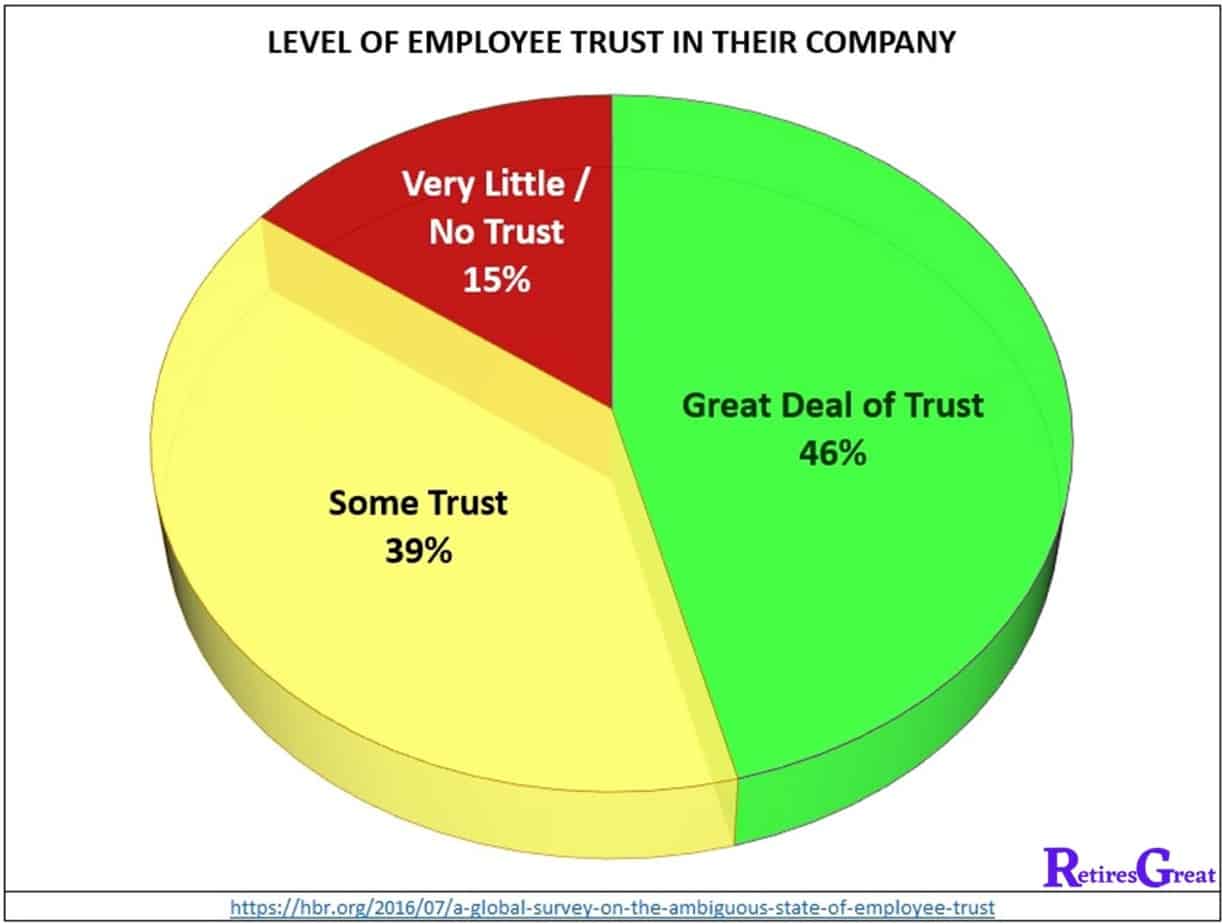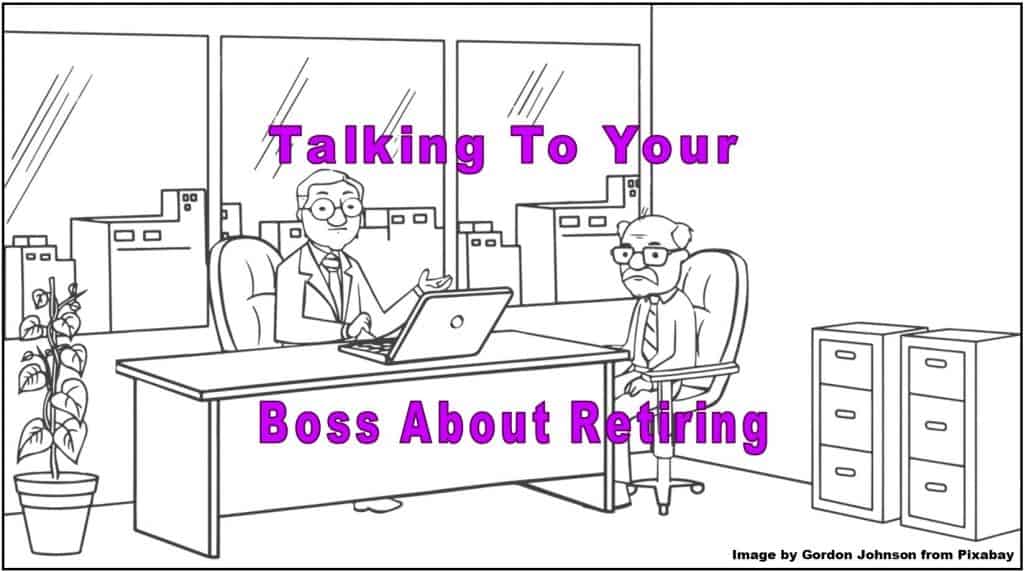Back in the day, everyone retired when they turned 65. Everything used to be fairly cut and dried. Not so much anymore with rampant downsizing, outsourcing and the demise of pension plans. You might be wondering how to best bring up the topic of retirement.
How to gracefully retire from a job requires open communication with your employer. Only with a win-win approach, will you achieve a work legacy to be proud of. There’re numerous factors to consider before giving notice or making the big announcement.
Benefits of Retiring Gracefully
Who doesn’t want to leave on their own terms, with their head held high respected by their peers? Besides the pride of your work legacy, there are other benefits:
In spite of all these good reasons, there’s also lots of things that can go wrong.
Factors to Consider in How to Gracefully Retire from a Job
In a perfect world, we’d all sit down with our boss and have the discussion. Unfortunately, often it never happens. An interesting article by Booming Encore, The Retirement Discussion Dilemma highlights the challenges in todays work places.
Employer Perspective
The underlying issue is trust. This can be a sensitive topic your boss may be reluctant to broach with you. This can be further exacerbated when there’s a strained relationship which can occur when your boss is significantly younger.
A handful of top performers are rewarded with promotions, higher salaries, and increased responsibilities. They’re highly valued often being groomed for executive leadership positions. The rest of us may be deemed as competent, yet replaceable.
Unless providing incredible value and knowledge, older workers become at high risk of downsizing. Also, there’s room for misinterpretation to even suggest you’re thinking about leaving.
Succession planning is management’s responsibility. You’d think they’d proactively engage older workers to ensure smooth transitions. Seldom is that the case.
For instance, Shannon's previous employer decided to outsource all engineering positions overseas. Needless to say, there wasn’t much communication with staff until the heads began to roll.
Employee Perspective
The greater risk of opening this can of worms is from the employee’s perspective. A study by Harvard Business Review found 15% of workers have little or no trust in management. A further 39% have only some trust.

Their findings reveal the top five reasons for trust issues:
Mistrust and doubt abound with over half of all employees. How to gracefully retire from a job could become an issue. Mentioning retirement is risky and might be grounds to fast-track you out the door.
After all, management is always looking for ways to cut costs. Another risk could be treating you as a “has-been”. Forget about any pay raises, promotions, or bonuses. You might be stripped of your projects, clients, or responsibilities.
Work Culture
Some organizations are far more progressive when it comes to managing their work force. This is exemplified with engaged employees passionate about doing their best and committed to company success.
Input is welcome and appropriately rewarded. This environment is more conducive to discussing end-of-career options. On your mind might be how previous co-workers were handled.
Were they unceremoniously shunted out or was there a respectful transition? In some instances, there may have been accommodations offered such as greater flexibility and/or reduced hours.
In other cases, a contract position could be in the works. Some employers might offer packages to encourage older workers to leave. These might include extended benefits and/or financial incentives.
There’s also the risk these may not be available in the future. If you’re interested, this would be the time to speak up. The bottom line, based on the culture, how safe do you feel bringing up the topic?
Talking to Your Employer About Retiring
Think everything through before scheduling that fateful meeting with your manager. Unless you’re ready to leave imminently, express you’re tentatively thinking about retiring. Request their feedback on making this a smooth transition.
This might be the most important meeting of your career. The last outcome you want is to “burn any bridges” and leave on bad terms.
Even if you anticipate a life of leisure, things may change down the road. There’s a number of considerations to keep in mind:
How Much Notice to Give
Two to three weeks notice is generally deemed sufficient for most basic jobs. For professional and senior positions, 6-9 months allows for better succession planning and knowledge transfer.
Having said that, a great deal depends upon all those factors previously mentioned. If you’re in a toxic or demeaning environment, it might be best to provide minimal notice.
Providing a longer notice could lead to your remaining days being sheer hell.
This happened to one of my co-workers. After turning 70, he expressed he wanted to work a couple more years until his wife was ready to retire. As an inside salesperson, he loved the social interaction and his clients. In spite of consistently meeting or exceeding quotas, management decided it was time for him to go.
In fact, they did everything they could make work uncomfortable. He put up with verbal abuse and publicly being embarrassed. His commissions were rigorously audited and they even found a way to cut his benefits!
My experience wasn’t much better which I share in Bad Boss.
Management may not have quite the same view as you. For instance, they may choose to hire or retrain someone for your position without your input. In some instances, they’re looking for fresh blood and a new approach.
Also, co-workers may start treating you differently. On one hand they’re happy for you. But, with change comes stress and uncertainty how it’ll affect them.
Some might even feel resentful or jealous. A protracted separation period can be like living in the twilight zone.
Announcing Your Retirement
It’s customary for management to formally announce your retirement shortly before you leave. Prior to then, you might want to personally inform those you work closely with. In addition, emails could be sent to other work-related acquaintances during your final days.
Your first responsibility is to your employer and following company guidelines. As such, they’ll likely make an official announcement when it’s deemed appropriate. Your manager should provide guidance on this.
There may also be a less formal approach such as a team meeting, a luncheon, or other venue. Unless otherwise directed, you might want to privately inform co-workers, clients, and suppliers you work closely with.
Use your best judgement as to the timing of it and whether it should be done on a confidential basis. Also, bear in mind this may change your working relationships.
Closing Thoughts
How to gracefully retire from a job might be as simple as providing 2-3 weeks notice. More realistically, it’ll involve open honest communication with your manager long before this.
Trust is often in short supply potentially leading to assumptions and less than desirable outcomes. From a management perspective, they should be providing succession planning to ensure a smooth knowledge transfer.
By initiating conversations with older workers, they can boost trust creating a win-win environment. For the employee, it reduces risk and opens opportunities to leave on their own terms.
Whether this be a voluntary early separation, bridge employment, or extending their years of service. Further to this, notifying your boss and co-workers can directly impact how your final days (or months) will be.


Good tips! It is crazy how much work environments vary in this day and age, and I have seen some very wonderful–and very toxic–management and workplace cultures.
Thanks, Bethany! Yes, there are still too many toxic work environments out there. I, too, have had experiences in both. My last one before retiring was the most toxic one which I wrote about in our Bad Boss article. It’s good that the good outweigh the bad for sure! ? Debbie